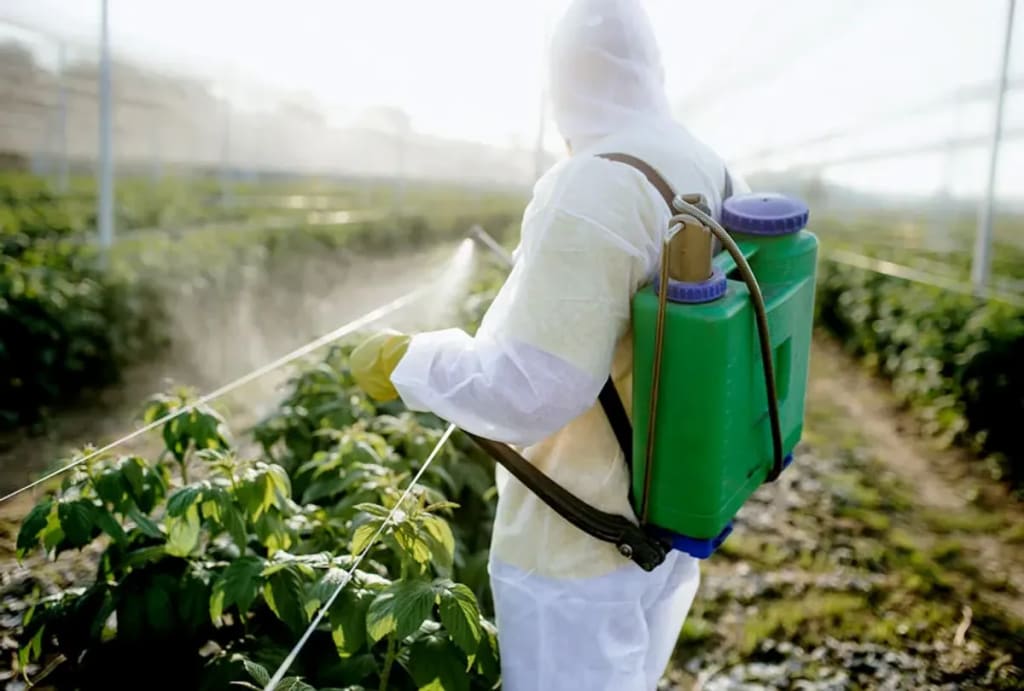Unraveling the Connection Between Chemicals and Health Issues: A Personal Journey
A Glimpse into the Impact of Modern Agricultural Practices on Our Health

In today's modern world, many of us are becoming increasingly aware of the relationship between the food we consume and the state of our health. For some, this awareness has been shaped by personal experiences that have unveiled a deeper connection between the chemicals used in agriculture and the health issues we face. This article delves into one individual's personal journey, shedding light on the profound impact of chemicals on health and the need for a shift towards conscious eating and sustainable practices.
A Family History Shrouded in Health Challenges
The narrative begins with a glimpse into the author's family history, one marked by tragedy and the prevalence of health issues. It's a story that starts on a rural farm in Iowa, where their grandfather toiled as a corn farmer, and their grandmother worked as a nurse at the local hospital. The family had eleven children, with the author's mother being the oldest. But what sets this family apart is the emergence of a genetic bleeding disorder, hemophilia, that appeared for the first time in their lineage. The timing of this occurrence is noteworthy, as it coincided with the introduction of chemicals like DDT on corn and wheat fields in response to a locust plague. The author ponders whether exposure to these chemicals could have contributed to the health issues that plagued their family.
Tragically, the author's mother was not exempt from the family's health struggles. At the age of 16, she began to experience digestive problems, and by 24, she received a grim diagnosis of CREST syndrome, which comprises five autoimmune diseases. She was given only a decade to live, and her life was cut short due to this debilitating condition. The family's health woes didn't end there; the author's lineage was marred by an array of ailments, ranging from mental illness and autoimmune diseases to various forms of cancer. The scourge of HIV and AIDS in the 80s and 90s also took a heavy toll on the family, leading to eight members succumbing to the disease due to tainted blood transfusions.
A Resolve to Defy the Genetic Odds
With this haunting backdrop of health issues in their family, the author was determined not to succumb to the same fate. They embarked on a quest to understand the significance of prevention. Armed with an extensive education in nutrition, cultural anthropology, and human anatomy, the author came to realize that their body required a different approach than the dietary norms of the time, which advocated for breakfast cereals, margarine, low-fat products, packaged foods, and artificially sweetened beverages.
The Art of Prevention and the Power of Real Food
The author's solution was simple yet profound: embracing the power of real, unprocessed foods. They wrote a book, "Changing Habits, Changing Lives," which emphasized the importance of consuming foods made from scratch. Their kitchen became a haven for real, unadulterated ingredients. This transformation not only impacted their own health but also the well-being of their children, who grew up without the need for medications, antibiotics, or painkillers.
The Unexpected Ailments and Dietary Exploration
Surprisingly, as the author approached their mid-40s, they began to experience health issues that were interfering with their life. Symptoms included lower back pain, excruciating hip pain, throat tightness, migraines, dry skin, and dry hair. As a nutritionist, the author decided to investigate the root cause through dietary changes. After an extensive period of eliminating various foods, they discovered that certain dietary components exacerbated their symptoms. This led to an insightful revelation: wheat was a major contributor to their health issues.
The Modernization of Wheat
To understand the connection between wheat and health, the author embarked on a deep dive into the history of wheat production over the past century. They discovered a significant shift in the way wheat was processed. Wheat was refined, with the removal of the germ and bran, replaced with synthetic vitamins and minerals. Traditional methods of wheat preparation, such as fermentation and soaking, were abandoned in favor of shortcuts. Wheat had become a ubiquitous presence in the modern diet, appearing in 75% of packaged foods, not only as a grain but also as additives, preservatives, flavorings, and fillers. It was even found in medications and cosmetics.
The Glyphosate Factor
While the changes in wheat processing were concerning, the most alarming discovery was the extensive use of glyphosate, the active ingredient in Roundup, in wheat production. Glyphosate, with a history of patents as a chelating agent, herbicide, antimicrobial, and bioside, had been used widely in modern agriculture. It disrupted the ecological balance of soil microorganisms, impacting plant health. Glyphosate exposure was not limited to wheat; it extended to other crops and even found its way into medications and personal care products.
A Cascade of Health Issues
The ramifications of glyphosate's presence in our food chain were far-reaching. Celiac disease, wheat allergies, non-celiac gluten sensitivity, autoimmune diseases linked to gluten, and other food allergies began to surge. The microbiome in our gut, essential for digestion, vitamin production, and immune system support, was slowly eroded by glyphosate's continuous presence.
A Call to Action
In light of these revelations, the author presents a call to action. First, there is a need for a deeper understanding of food production practices, with an emphasis on local and sustainable options. Individuals are encouraged to explore their local farmers' markets and engage with farmers to understand their farming methods.
Second, if wheat seems to be a contributing factor to health issues, a six-week trial without it could offer clarity on its role in one's health.
Lastly, the author advocates for a return to the kitchen to prepare nourishing meals for families. This, they believe, is the path to healing and paving the way for a health-conscious movement that can change the future for ourselves and generations to come.
In conclusion, this personal journey serves as a stark reminder of the connection between chemicals used in modern agriculture and the health issues we face. It highlights the importance of conscious eating and sustainable practices for a healthier future. It is a powerful testament to the transformative impact of real, unprocessed foods and the pressing need for a shift in our dietary choices and agricultural practices.
About the Creator
Reader insights
Outstanding
Excellent work. Looking forward to reading more!
Top insights
Compelling and original writing
Creative use of language & vocab
Easy to read and follow
Well-structured & engaging content
Excellent storytelling
Original narrative & well developed characters
Expert insights and opinions
Arguments were carefully researched and presented
On-point and relevant
Writing reflected the title & theme





Comments (1)
Very effective and nice content about Health.